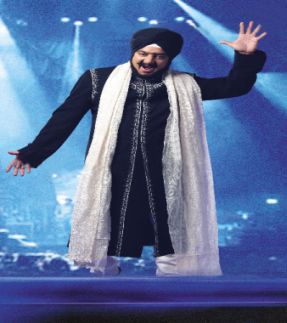
 |
 An association between Himesh Reshammiya and Kamal Haasan would have been hard to imagine couple of years ago. Yet Himesh Reshammiya who has rocked the nation with his singing, has been assigned one of Haasan’s most prestigious projects to date. Let’s not get into the game of how A.R Rahman who would composed the music, as he was first offered the assignment. One should understand that each composer has been trained and groomed in a different way. Hence, the approach undertaken by each composer will be radically not the same as the next composer. The soundtrack is dubbed from Tamil, and lyrics by Vairamuthu and Vaali have been re-written by Sameer. An association between Himesh Reshammiya and Kamal Haasan would have been hard to imagine couple of years ago. Yet Himesh Reshammiya who has rocked the nation with his singing, has been assigned one of Haasan’s most prestigious projects to date. Let’s not get into the game of how A.R Rahman who would composed the music, as he was first offered the assignment. One should understand that each composer has been trained and groomed in a different way. Hence, the approach undertaken by each composer will be radically not the same as the next composer. The soundtrack is dubbed from Tamil, and lyrics by Vairamuthu and Vaali have been re-written by Sameer.
Vinith kicks start the soundtrack with Koi Tumsa (Come Dance With Me) in a typical Reshammiya mode including instruments like the sarangi and tabla, which are predominant in the past hits of the composer. The hook line is borrowed from ‘O Makhna Vay’ from Dil Maange More, while the ‘antaras’ are fresh. Less emphasis is laid on the melody as it appears that because of the feel of the title, more work has been put into the beats with a brief rock influence in the middle. Vinith, who has not been heard frequently on the playback singing scene, performs as requested, with no extra touch. On the whole, the track is half-baked, probably due to the wrong mix of melody and beats. Venturing into the devotional genre in Bollywood, while keeping the script of the movie in mind, might be a tough task for composers. In the last couple of years, few music directors had a go at this genre. Anu Malik composed a striking tune for Lord Shiva in Ab Tumhare Hawale Watan Saathiyon, titled ‘Shivji Satya Hai’ and captured the right mood, with the soulful rendition of ‘Om Namah Shivaya Om’ elevating it to another level. Ismail Darbar in Kisna composed the acclaimed ‘Aham Brahmasmi’ which was semi-classically raag based, and was also on Lord Shiva. The composer hits the right notes with the spiritually devotional Om Namo Narayan based on Lord Vishnu and rendered by Hariharan. Bringing back the atmosphere of temples has been worked out in the best possible way by Reshammiya. The track exhibits the high production values of the movie. The song relies heavily on the chorus, the high-pitched vocals of Hariharan and devotional instrumentals. Orchestration and arrangements are first-class, with appropriate pauses. All can be summarized in the first interlude, which is simply outstanding. Himesh Reshammiya further displays that he has the capability to compose such devotional tunes – here requiring a mix of spiritual, meditative and epic overtones.
The best song of the soundtrack is Mukundha Mukundha sung by Sadhana Sargam and has Kamal Haasan chipping in a few lines in the last part. Himesh Reshammiya scores again in the devotional genre, in this track based on Lord Vishnu. The bhajan approach works well in this context and the instruments used vary significantly from ‘Om Namo Narayan’. Sadhana Sargam is impressive in her rendition and leaves a lasting effect on melody lovers. Hey Black Ho Ya White by Shalini Singh is too fast-paced and does not offer anything special. High on beats and stuffed with English lines, the track commences on an exciting prelude but loses steam after a few lines. A regular Reshammiya sound is heard in the background. The soundtrack of Dashavtar contains two of the most precious compositions of Himesh Reshammiya in the form of ‘Om Namo Narayan’ and ‘Mukundha Mukundha’. The rest of the songs are on the lines of his music like in Dil Maange More, Vaah! Life Ho Toh Aisi and Aap Ki Khatir and may appeal better in their original versions only.
|
| Comments | Contact Us | Advertise | Terms of Service | Privacy Policy |